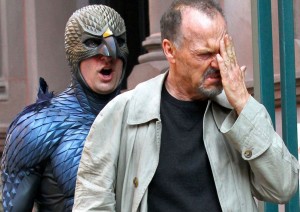
BIRDMAN * * 1 / 2
Starring Michael Keaton, Edward Norton, Emma Stone, Naomi Watts and Zach Galifianakis. Screenplay by Armando Bo, Alexander Dinelaris, Nicolas Giacobone and Alejandro Gonzalez Inarritu. Directed by Alejandro Gonzalez Inarritu.
Light as an anvil, Alejandro Gonzalez Innaritu’s Birdman is a sometimes dazzling, often infuriating act of gaseous virtuosity. I was never sure if I should applaud or roll my eyes. A lot of the time I was doing both. The full, run-on title is actually Birdman or (The Unexpected Virtue of Ignorance), and those pointless punctuation games provide a fitting précis of the movie’s laborious playfulness.
Of course, nothing comes lightly to Inarritu. His exhilarating debut Amores Perros gave way to the monotonously miserable grinds of 21 Grams, Babel and Biutiful – artfully photographed wallows in one-note suffering that, in the words of Alvy Singer, “achieved total heaviosity.”
Birdman is Inarritu’s idea of a comedy, and I must admit that the early going is indeed very funny. Michael Keaton stars as Riggan Thomson, a fading movie star whose career has fallen on hard times ever since he stopped playing a certain superhero back in the nineties. (Sound familiar? It’s supposed to.) Riggan has gambled what’s left of his fortune on a crazy hail-mary bid for artistic credibility, starring in and directing a self-penned Broadway adaptation of Raymond Carver’s What We Talk About When We Talk About Love.
Much to the consternation of Riggan’s harried producing partner (Zach Galifianakis, playing a different character for once and doing so quite well) the production is a shambles on the eve of previews. There’s a pompous Method know-it-all (the sublime Edward Norton) hi-jacking every scene, one actress on the verge of a nervous breakdown (Naomi Watts) and another (Andrea Riseborough) who is sleeping with her director and just might be pregnant. Riggan’s also looking after his daughter (Emma Stone), fresh out of rehab and terribly unamused, while his ex-wife (Amy Ryan) keeps dropping by to remind him of all the good things he’s thrown away.
Then there’s the matter of that pesky super-influential theatre critic (Lindsay Duncan) who sits upon a neighborhood barstool with her notebook, scrawling invective in longhand – which is something I do all the time, so I liked her right away. Unfortunately she’s promising to give Hollywood poseur Riggan a career-ending review just on general principle.
For at least the first hour, Birdman is a cheerfully vulgar, door-slamming backstage farce – sorta like an NC-17 Noises Off with everybody talking about the frequently undressed Norton’s massive cock. (“Do you really think it looks massive?” he asks, in all false modesty.) Except these doors never really slam, as the entire film has been intricately choreographed to play out as one single digitally-assisted long take, with rock-star cinematographer Emmanuel Lubezki’s camera gliding in and out of dressing rooms, up and down crowded hallways, into the rafters and onto the roof of Broadway’s St. James Theatre.
It’s a spectacular stunt, but a stunt nonetheless. On one hand the vertiginous motion conveys Riggan’s cluttered headspace, with an all-percussion score thrown-in to deny us even a moment’s peace. On the other it is an enormous distraction, with actors arranged in awkward blockings and the audience fighting an irresistible urge to try and spot the seams. Worse, there’s no way to cut out of sluggish scenes that have already made their point, so whenever things start dragging you’re just stuck there until the camera finally follows Riggan out of the room. (Score one for the unexpected virtue of editing.)
Keaton’s quicksilver energy is put to fine use here, and Birdman’s early, sometimes viciously funny interludes do an expert job of painting Riggan as a vain fraud whose last ditch stab at relevance is really just an out-of-touch ego-trip. (Stone has a lovely monologue putting him in his place.) His play looks kind of awful, expanding Carver’s sparse story to include elaborate moonlight soliloquies and even a suicide. Norton runs away with the picture, aping his own storied prima donna antics with such hilarious self-regard that after awhile I laughed just looking at him.
Puzzlingly, in the second half Inarritu abandons the farcical tone and strips away the more interesting supporting characters until Birdman becomes almost a one-man show about a very tiresome mid-life crisis. Indulging in wannabe Fellini fantasy sequences and even having the chutzpah to employ a Shakespeare passage from a certain Scottish play without a hint of irony, the movie suddenly takes quite seriously everything and everyone it had previously been sending up. Like I said, nothing comes lightly to Inarritu. Total heaviosity again.
It all builds to an appreciably ghoulish punchline somewhat botched in the delivery, but by then you’re wondering if the movie might not be just as self-absorbed and out of touch as the character it was originally supposed to be kidding.
Besides, a picture savvier about Hollywood and Broadway would have ended with Birdman: Turn Off The Dark.